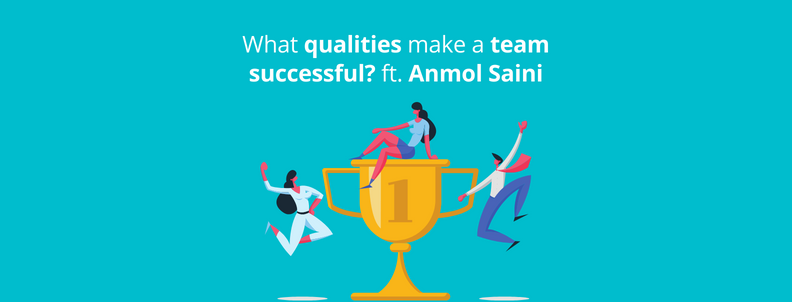Businesses often attribute their success to the dynamics of their teams. Obviously, the qualities incorporated in a team represent the business as a whole. However, if you are asked to list down these qualities, it can get you thinking. The list remains at the back of the mind but to actually explain it… well, that’s another story, Right?
Anmol – The Team Manager (who better to talk about such a topic) recently found himself in the same situation. And what followed was an email thread with a list of characteristics that make a team and in return a business successful.
SUB: 0 -> 1
Last week one of my friends asked what the three qualities I want to develop in my team are. And honestly, I could just think of two. So I joked about him (benefits of being friends) and diverted the topic.
I am searching for the third one, but confident in these two qualities.
- Curiosity – This is equivalent to fresh air (at least for me). Make bland work tasty. I have seen people complaining about a boring task, and for the same task, people saying they are going to read a book to understand it more as it was so fascinating. I have been to this camp recently while working with Divya. The pharmaceutical domain is like coding on humans instead of a laptop. A lot of interesting by-products come up when you are curious about the task (patents, articles, research papers, new utility, sometimes even products). People repair code in the official library on Github, write blog posts on solutions and improve the efficiency by exponential numbers just because their mind said it doesn’t look right when everyone said this is how it works. I love whenever I am working with someone who’s curious and this is the trait that I want to preinstall in everyone who joins our team.
- Robust Resilience – This is a fully loaded term, and I was not even clear with the definition a few days back (although I have heard this word from a lot of influencers). To understand it, we may have to define supporting variables first.
Robust – It’s the capability to perform in case of known failure. This is an essential pillar for any team and is optimized by systems. Like we don’t have the API for this data, or we don’t have tier 1 results. There would be a guideline for Plan B as to what to do now. Robustness comes when you learn from failure and code the system so that it doesn’t happen again. For this to happen, there should be a psychological safety net where you can openly share the failure and design the process to avoid it in the future. This is the critical part where culture would be the deciding parameter. To publicize failure is the anti-goal of humans since our teacher is evolution. Building social capital with a team where people can share openly is a big challenge, and we are still solving it across the company level (it’s safe to say we have solved it on the team level). Sharing TIL is one such way, where you encourage collective knowledge so that someone else won’t repeat the same mistake again. Another is not to discard things as if they would be common knowledge, and we celebrate all learning without plotting it against experience level.
Now, you can achieve robustness in a lot of ways. For instance, I can set up a system that says our product should have zero bugs. Anytime a bug comes up, we corner one developer, put the blame, and make a lesson for everyone out of it. Another way is to do a postmortem, document the best practice, make a checklist of things to do, and put a system so that it doesn’t happen for the same reason. Both ways achieve the same goal, but internally they are totally opposite. Companies that focus on just numbers will most likely adopt the first method as it’s easy.
There’s a slight signal that is emitted when such things happen. People go into two modes; one is reactive (firefighting mode). This is where you come into motion once there’s a fire, and then you do all you can to control it. Put band-aid solutions. Another is proactive, where you start anticipating the problem (this is not the same as premature optimization), or you draw parallel in different directions. Hanisha recently hacked one of our products, and this gave us an idea that what if someone who’s far more experienced than us hacked our product which we feel is totally safe and used by a lot of clients? So we are hiring a third-party vendor to do a pen test on our products. People who anticipate and put systems in place even before someone thought there would be a fire go a long way in a speedier manner. You are promoted for the job that you have already done.
Once you have robustness, you can focus on resilience, as robustness is a prerequisite for resilience.
Resilience is, in short, the power where you can narrate the direction in case of unknown unknowns. These are the situations that were never anticipated (Covid 19), and how to react in such situations is resilience. You need to be creative to evolve continuously. When I first met our telecom client in China, I said zero words. I bet the team thought I was mute. I could code and solve any problem that they were saying, but I was not a good translator. I was stuck in my code editor. After the trip, Deepak shared a small tip with me. He said to a small talk whenever you hire a cab. This was so frustrating and challenging at first, but I realized how important this small exercise was to be able to speak to clients. This is why I push my team to do a lot of things that sometimes make zero sense at face value, like marketing your talk and watching Netflix/Masterclass on a lot of different topics. This is why you have many workshops, so you don’t act like a mannequin in client meetings. To make you resilient. Some of you might hate it because the unknowns are still unknown, and the logical part of our brain asks why they put this much pressure on non-relevant stuff. Some lessons are learned the hard way and with a ton of regret.
So Curiosity and Resilience are two that I have shortlisted, and I am still searching for the third one. If you have any suggestions, please let me know 🙂
Regards – Anmol
To add to our list of qualities that make a successful team, Chakshu Kalra, Director of GreyB replied with the following:
Love the two points, Anmol. This is impressive.
I feel writing is one thing that should be developed across teams. By writing I mean, thinking by writing what is coming to your mind. This breeds a lot of clarity in one’s thinking.
I also love the concept of anti-fragile. This is one thing that I still find underrated by people.
Kind regards, Chakshu
Understanding the place from where Anmol and Chakshu are coming, the above qualities in a team make perfect sense and are essential for delivering promising results. What other qualities do you think are essential in a team? Share it with us in the comment section below.
Here’s something for your next read: What does having skills mean at GreyB?




